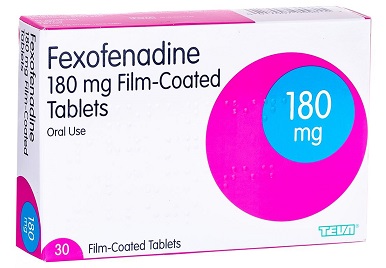Italian Clinical Study Reveals Promising Breakthrough In Long-COVID Treatment: Antihistamines Improve Cardiovascular Symptoms And More
Long COVID - Antihistamines Improve Cardiovascular Symptoms Jul 18, 2023 2 years, 6 months, 1 week, 2 days, 23 minutes ago
Daily treatment of fexofenadine (180 mg) and famotidine (40 mg) for 20 days found to improve Long COVID conditions
Long COVID: In a groundbreaking study conducted by a team of Italian researchers, a potential breakthrough has been found in the treatment of long-COVID. Long-COVID is a complex condition characterized by a range of symptoms that persist for weeks or even months after the initial SARS-CoV-2 infection. Despite its prevalence, effective therapies for
Long-COVID have remained elusive. However, this new study suggests that antihistamines could hold the key to alleviating the cardiovascular manifestations and other symptoms associated with the condition.

Led by the Clinica Santa Rita del Gruppo Policlinico di Monza, Italy, in collaboration with the University of Milan, Istituto Clinico Beato Matteo, Ticinello Cardiovascular and Metabolic Centre in Pavia, and RCCS Multimedica, the study focused on the potential role of mast cell activation (MCA) in the pathophysiology of Long-COVID.
Mast cells are immune cells that play a crucial role in allergic reactions and inflammatory responses. Previous research has indicated that MCA may be involved in the mechanisms underlying the cardiovascular symptoms of Long-COVID.
The study team aimed to assess the effectiveness of histamine receptor blockers, specifically fexofenadine (an H1 receptor blocker) and famotidine (an H2 receptor blocker), in patients with Long-COVID who had not responded to other treatments.
The study involved 14 patients with Long-COVID symptoms attributed to MCA and 13 control subjects. The patients received a daily treatment of fexofenadine (180 mg) and famotidine (40 mg) for 20 days, and their symptoms were evaluated before and after the treatment period.
The results of the study were highly promising. In 29% of the treated patients, Long-COVID symptoms completely disappeared. Additionally, all treated patients experienced a significant improvement in their symptoms, with a greater degree of improvement compared to the control group. Notably, no significant changes were observed in the control group, highlighting the specific benefits of the treatment.
These findings support the hypothesis that MCA plays a crucial role in the pathophysiology of Long-COVID, as suggested by previous research.
Furthermore, the study suggests that blocking histamine receptors could be an effective therapeutic strategy for managing the condition. While the study focused on antihistamines, the researchers also acknowledged the potential of mast cell stabilizers and ongoing trials exploring the use of montelukast in Long-COVID treatment.
The classification of Long-COVID into subtypes based on specific mechanisms and the identification of corresponding biomarkers could help tailor treatments for individual patients. However, further research and larger studies are needed to validate these findings and delve deeper into the mechanisms involved in Long-COVID. The development of biomarkers and recognized classifications would aid in the administration of personalized therapeutic strategies for patients with
long-COVID attributed to MCA.
In addition to the cardiovascular benefits observed in the study, the researchers noted that none of the treated patients reported any worsening of Long-COVID symptoms. This reinforces the potential effectiveness and safety of histamine receptor blockers as a symptomatic therapy for Long-COVID.
The Italian study provides a glimmer of hope for the millions of people worldwide suffering from Long-COVID. By identifying mast cell activation as a potential key player in the condition's pathophysiology and demonstrating the benefits of antihistamine treatment, this research opens up new avenues for targeted therapies. As scientists continue to unravel the mysteries of Long-COVID, there is optimism that improved treatments will emerge, bringing relief to those who have been grappling with the long-lasting effects of the virus.
The study findings were published in the peer reviewed journal: Frontiers in Cardiovascular Medicine.
https://www.frontiersin.org/articles/10.3389/fcvm.2023.1202696/full
For the latest on
Long COVID, keep on logging to Thailand Medical News.
Read Also:
https://www.thailandmedical.news/news/university-of-california-study-shows-that-common-otc-antihistamines-such-as-diphenhydramine-can-help-alleviate-certain-long-covid-symptoms
https://www.thailandmedical.news/news/covid-19-treatments-study-shows-using-dual-antihistamines-such-as-cetirizine-and-famotidine-helps-pulmonary-symptoms-in-covid-19-patients
https://www.thailandmedical.news/news/uk-researchers-find-that-t-cell-perturbations-persist-for-several-months-after-mild-covid-19-and-contributes-to-long-covid-antihistamines-help
https://www.thailandmedical.news/news/breaking-american-and-german-study-shows-that-heartburn-drug-famotidine-with-aspirin-prevents-covid-19-disease-severity-and-mortality
https://www.thailandmedical.news/news/covid-19-drugs-spanish-researchers-find-that-early-treatment-with-antihistamines-like-cetirizine-can-reduce-risk-of-covid-19-hospitalization
https://www.thailandmedical.news/news/u-s-silico-and-vitro-study-finds-that-montelukast-might-be-a-inhibitor-of-new-sars-cov-2-omicron-variants-and-sub-lineages
https://www.thailandmedical.news/news/indian-study-adds-more-evidence-that-the-asthma-drug-montelukast-singulair-can-inhibit-sars-cov-2-replication-and-is-a-potential-covid-19-drug
https://www.thailandmedical.news/news/covid-19-drugs-canadian-study-indicates-that-asthma-drugs-zileuton-and-montelukast-could-be-repurposed-to-prevent-covid-19-s-cytokine-storm
